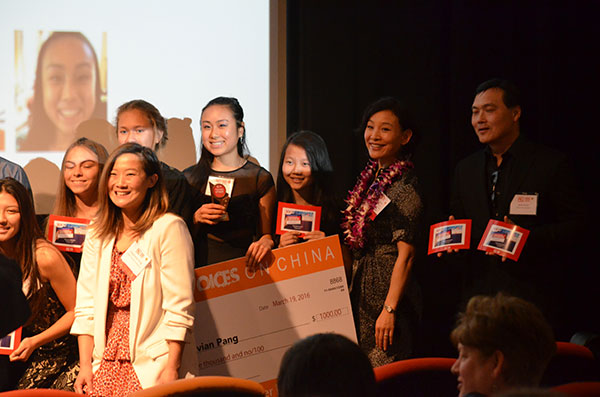Student videos call for better relationship with China
By LIA ZHU in San Francisco (China Daily USA) Updated: 2016-03-21 11:18
 |
|
Joan Chen (second from right), head judge of the second "Youth Voices on China" online video contest, presents a $1,000 award to Vivian Pang (fourth from right), winner of the high school division at the screening event on March 19 at the New People Cinema in San Francisco. LIA ZHU / CHINA DAILY |
A national online video contest titled Videogram to the White Housechallenged American youth to provide their own ideas and proposalsby producing a short video.
Open to US students ages 13 to 30, the second "Youth Voices on China" online video contest got 234 students to register, and 177 of them, representing 70 different schools in the country, competed for awards in three categories – middle school, high school and college.
In their videos, the students suggestpromoting better understanding between Chinese and American youth through martial arts, traditional Chinese medicine, clean air and ecology projects, community service as well as cultural exchange trips.
The videosgenerated almost 100,000 page views and were viewed in China, India, Japan, Australia and Ireland, said Monica Lee, executive director of the 1990 Institute, a San Francisco-based non-profit organization dedicated to improving relations between the peoples of China and the US. The organization launched the program in 2014.
Lee, who called the submitted videos "super outstanding" and "creative",told the contest finalists at the awards ceremony on March 19 at the New People Cinema in San Francisco that she hoped"Youth Voices on China"was the first step toward becoming"that influential voice that inspires others" no matter what field they end up in.
The $30,000contest is aneducational programaimed at fosteringmore global awareness among young Americans and to inspire them to start thinking about the importance of US-China relations to their future. Last year's contest challenged students to think broadly about China and how it may affect their future.
Joan Chen, a Chinese actress and head judge of the contest, said that this year's contestants showed great creativity in their production and stressed that that would be the key to winning next year's contest, which will be centered on inspirational Chinese travel stories.
"We often hear people protest, for instance, on the Oscar night the joke of three little kids carrying briefcases as accountants," Chen told the audience. "We need to develop our talents to write the script, to tell our stories. … That's why I encourage our children here to get into the film, because only you can change the situation, not by protesting, but by creating."
In the video titled The Importance of Exchange, Jana Nudelman and Ludwin Vielman, both students from Florida International University and winners of the college division, told of their "life-changing" experience on a six-week exchange program in China, where they learned the language, explored the culture and crafted new friendships.
"But the media are constantly encircling us with talks about China's military expansion, environmental issues and form of government; we become scared of this great nation and forget that many citizens are individuals with their own hearts, feelings and aspirations,"Jana said in the video.
"This is why I think exchange is important. It allows us to engage in dialogue and reminds us to see Chinese people as friends that are working towards the same goal as us," she said.
With a short film combing animation and live video footage, Vivian Pang, a student from the College Preparatory School in Oakland, California, proposed a community service projectwith a Chinese orphanage. She won the award in the high school division.
Vivian interviewed a Chinese teacher, students, the president of a Chinese adoption organization and an American who lived in China. She incorporated different perspectives on US-China relations and how to strengthen them.
The winning team members in the middle school division were Ming-Wei Fasquelle and Ming-An Fasquelle,students from the International School of Los Angeles,and Ming-Mei Wolfe, a student fromthe NYC Lab School for Collaborative Studies in New Tork.
"The world has many complicated issues and we need the world's two greatest powerhouses to solve them together," said Ming-Mei.
Their cultural exchange idea is a Chinese-American cultural competition for teenagers that engages them in activities comparing and contrasting Chinese and American cultures, such as making dumplings and pizza, or flying a kite and pitching a tent.






